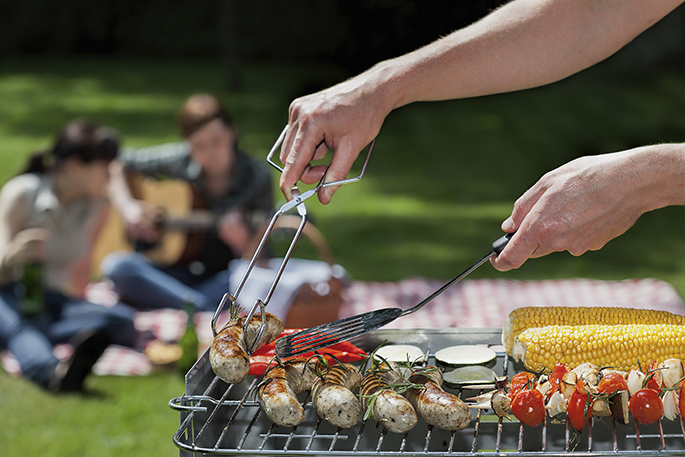New Zealand Food Safety is sharing some simple food safety tips for Kiwis to follow as they enjoy good food with whānau and friends over summer.
"We know that half of the foodborne illnesses in New Zealand originate in the home. Following good food safety practices is an important way to keep friends and family from getting sick," said New Zealand Food Safety deputy director-general Vincent Arbuckle.
"Most of this can be avoided by taking some simple steps to keep safe, including washing your hands, keeping your prep space clean, taking extra care with handling raw chicken, cooking food thoroughly and keeping it cool if you're on the go."
Campylobacter is the most reported cause of foodborne illness in New Zealand with around 6000 reported cases annually. Rates of illness from Campylobacter can spike over summer, usually associated with preparing and consuming poultry at home.
The great news is that New Zealand's rates of illness from Campylobacter have reduced significantly since 2006 due to sustained efforts by the poultry industry, the major retailers and better awareness by consumers.
"It's especially important that food safety is top of mind when you're cooking for your frail older, pregnant, very young and immune-compromised whānau, as the consequences for them from getting sick from food can be devastating.
"Remember food safety is the key ingredient when preparing food for the holidays, so here are some tips for a safe summer."
Hot tips for summer food safety success
Washing your hands is the first line of defence and one of the best ways to prevent harmful bacteria spreading to your food.
New Zealand Food Safety's 2024 Consumer Insights Survey shows that most consumers wash their hands when preparing food, but there is room for improvement, and it is a timely reminder to do this when out and about too. According to the U.S. Center for Disease Control, handwashing can prevent about 30% of gastrointestinal-related sicknesses, and about 20% of respiratory infections (for example, colds). For immune-compromised people, this reduction in gastrointestinal-related illness is up to 58%.
Wash hands thoroughly with soap and water and dry them well before handing food. You could use hand sanitiser if you don't have access to water.
Always wash your hands after handling raw meat and poultry (like chicken and eggs), going to the toilet, or changing nappies, touching pets or animals, gardening, or any other activity that makes your hands unclean.
Did you know, about half of New Zealand consumers are still washing their chicken before cooking? This can spread bacteria around the kitchen and increases risk of contamination. Instead, we recommend that you pat chicken dry with a paper towel and put the paper towel straight in your rubbish bin.
Always wash your hands with soap and water (preferably warm) after handling raw chicken. Again, you could use hand sanitiser if you don't have access to water.
Keep your raw chicken separate from ready-to-eat and fresh foods, using separate chopping boards, plates, and utensils to prepare raw chicken.
Always thoroughly wash preparation surfaces, dishes, and utensils with hot soapy water, then rinse and dry them before using them for other foods.
Use a different plate for raw and cooked chicken.
Don't let raw chicken or its juices touch ready-to-eat foods, and make sure you cook your chicken thoroughly until juices run clear.
Use separate utensils, chopping boards and plates for raw and cooked meat, and barbecue meat until it is more than 75°C all the way through and thoroughly cooked. If you don't have a thermometer, turn chicken, pork, and sausages often so they cook evenly, and juices run clear. Mince should be thoroughly cooked right through (until firm and browned) to kill harmful bacteria that could be introduced through processing and/or preparation.
Make sure your barbecue and cooking tools have been cleaned with soap and water before using. Marinate meat in a covered container in the fridge and cook the marinade before pouring over cooked meat.
Keep raw meat and cooked food or ready-to-eat foods (like salads) separate.
4. On the go with food? Chill it
With summer here it's a good idea to get picnic and travel-ready. Freeze ice packs or bottles of water to ensure you're sorted to pack a chilly bag or bin.
Store foods like salads, meats, and cheeses in a chilly bin with ice packs until needed. Cover and chill your food until you cook it – and chill any leftovers as soon as possible too.
Leftovers make for great picnic and camping fare. Just make sure you eat them preferably within 2 days – when in doubt, chuck them out.
If you have long travel times after food shopping or won't be going home straight away, have a chilly bag or bin with ice packs in your car to transport chilled or frozen foods, and transfer them to the fridge or freezer as soon as you get home.
Find out more about how to stay food safe at home this summer on our website:
Safe food preparation, cooking, and storage at home



0 comments
Leave a Comment
You must be logged in to make a comment.